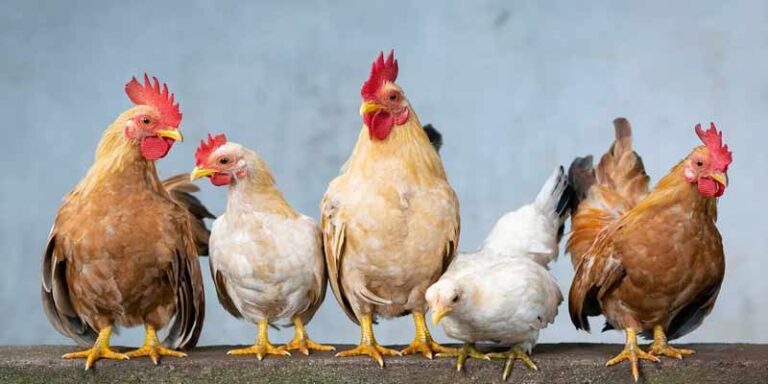If you’re considering keeping a chicken as an indoor pet in your home or apartment, there are a few things you should think about before making your choice.
It may seem to be a decent idea at the moment, but it’s one that you’ll come to regret in the future.
I’ve compiled the reasons from personal experience and other chicken owners. Below are the 9 main reasons why it isn’t a good idea to keep chickens as indoor pets.
1. Chickens Enjoy Being Outside
One of the major reasons why chickens should not be kept inside is because they like everything about being outside.
It’s not just about being outside; it’s about being outside with enough room to roam, forage, and do everything else that chickens enjoy on a daily basis.
If the chickens are left outdoors in a run for a few hours, they begin to whine and seem agitated.
Even in severe weather, chickens prefer to be outside and free, and it takes extraordinary circumstances for a chicken to choose to go inside the coop (unless to lay an egg) during daylight hours.
Chickens are always on the go, eating, preening in the sun, dust bathing, scratching, and exploring throughout the day. Those are all things they are unable to accomplish inside the house.
2. Poop From Chickens Is A lot
This may sound self-evident, but unless you’ve previously raised chickens, it’s impossible to comprehend the quantity of excrement they generate on a daily basis.
Even outdoors and in the coop, things can become filthy fast, and bird excrement is particularly stinky.
Chicken poo appears in a variety of forms, ranging from runny to solid, and without notice, so it’s not something you want on your living room floor.
Chicken diapers are available, however, they will eventually do more damage than good since the poo surrounding the vent will get compressed and packed around the feathers.
3. Chickens Carry Bacteria That Can Be Harmful
Salmonella and campylobacter bacteria are found in all chickens, and especially in chicken feces.
This bacterium may cause serious illness in people, and keeping hens inside raises the risk of cross-contamination from bird to human.
I learned the hard way that touching a chicken is enough to spread the germs – an experience I never want to repeat!
4. Chickens Require Natural Light
Chickens, like humans, need sunshine for their health and well-being.
Because a chicken’s daily routine and natural rhythms (such as laying and roosting) are based on daylight, lighting is used in chicken farms to guarantee consistent egg output.
In the end, you won’t be able to replicate natural sunshine inside, which may result in bad long-term health and pale cobs and faces.
5. Outdoor Chickens Lay Better Eggs
Chickens will need plenty of room to graze and forage for natural meals like insects, worms, plants, and seeds.
All of these factors contribute to the greatest possible egg production, which is a sign of a healthy and happy chicken.
A chicken’s laying schedule is also controlled by natural sunshine, as I stated above, and if they don’t get enough of it, their laying routine may be disrupted.
6. Indoor Chickens Can Be Unhappy
If a chicken can’t do everything that makes them happy, it will grow sad and perhaps depressed over time.
People maintain chickens for a variety of reasons, the most important of which is to provide a better life for their birds than they would have in an indoor chicken farm with limited space.
Anyone who has had their chickens quarantined due to avian flu knows how anxious they were to get them out again.
Chickens are excellent at vocalizing and letting you know when they’re unhappy.
7. They Have the Potential to Be Destructive
This may seem a little theatrical, but chickens can be clumsy and do a lot of damage in a short period of time.
It’s terrible enough when they get into a flower bed or a vegetable patch where you don’t want them to be, but I can’t imagine the havoc they’d cause inside the home.
8. Chickens Are Noisy Creature
Everyone knows roosters make a lot of noise, but hens can make a lot of noise as well.
Chickens are noisy animals that make a variety of sounds to communicate with one another as well as with us humans.
Chickens start vocalizing as soon as it becomes light in the morning, so if they’re inside your house, this may be a problem, particularly in the summer.
When chickens are bored and hungry, they become noisier in an effort to persuade you to let them out.
9. Chickens Can Become Aggressive
When hens get bored and irritated, they may become hostile against one another, which typically manifests itself as feather pecking.
When chickens are housed in indoor chicken farms, this occurs all the time, and it’s one of the major reasons why most ex-battery hens have bald patches and are in poor health when they’re re-homed.
On the other hand, hens that have greater room to wander, are kept busy and do not get bored, which will reduce the likelihood of them being violent.
Conclusion
If you’re considering raising chickens inside, please don’t interpret this post in a negative light. My goal is to make sure you have all the information, so you don’t make a choice you’ll later regret.
Chickens are creatures that thrive in the open air, and having the freedom of being part of a flock helps them remain happy, which is the most essential thing for them. Happy chickens will be healthier and will produce quality eggs.


